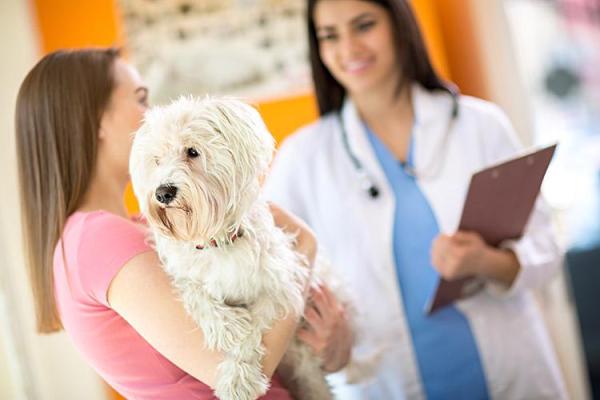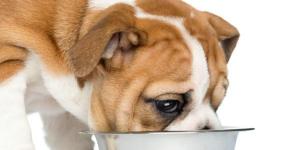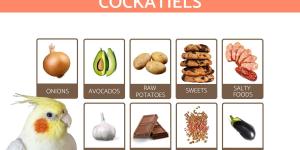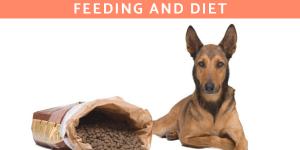Dog Cancer Diet - Food for Dogs With Cancer



See files for Dogs
Choosing the right diet for a dog with cancer is something which will need to be assessed with your veterinarian. Various treatments are used to treat cancer, the strength of which varies according to different factors. Whether the cancer has metastasized is one such important consideration. With treatments such as chemotherapy and radiotherapy, the effect on the dog's organism can be debilitating. It can seriously weaken their immune system and make normal tasks much more difficult. A decreased appetite is a common side effect of certain cancer treatments. Since the animal needs their strength for recovery, nutrition is particularly important at this time.
AnimalWised looks at how to determine the right dog cancer diet. We discover the best food for dogs with cancer, as well as what we need to do to ensure they receive the proper nutrition.
Feeding dogs with cancer
As stated above, a dog's organism will be affected to varying degrees by cancer treatments. Our veterinarian will be able to help us know what to expect according to their diagnosis and treatment options. Generally speaking, they will take the following into account when determining the right diet for dogs with cancer:
- Appetite: dogs with cancer often experience appetite loss as a side effect of their treatment. If this symptom of a dog losing their appetite is not addressed, it can result in them suffering from malnutrition. This means a basic aspect of the food for dogs with cancer should be palatability as it will help to motivate the dog to eat. Generally, wet foods are more appetizing than dry kibble.
- Symptoms: we must also look at the consequences of the cancer in our dog's body. There is often a significant loss of muscle mass during cancer treatment. For this reason, the diet must contain a high energy density.
- Cachexia: dogs with cancer may also have cachexia, a syndrome associated with various serious diseases which results in loss of muscle and fat mass, among other symptoms. The food we provide a dog with cancer should try to alleviate these effects.
- Emergency feeding: if the dog stops eating for several days, they will be seriously weakened and a feeding tube may be required to provide them with nutrients.
- Tumor size and location: some tumors can make eating difficult, especially those located in the digestive system. We must take into account the inconveniences they can cause, as well as the side effects of chemotherapy. These can include vomiting, which can be alleviated with antiemetics.
- Palatability: if the senses of smell and taste are altered, dogs may reject food. This aversion can be solved by offering an alternative diet, changing the location of the feeder or heating the food a little. These are all attempts to make the food more appetizing for the dog.
- Feeding: the process of eating itself can become difficult when a dog is being treated for cancer. It is recommended to divide the total daily food ration into smaller portions. This way, you can increase the number of feedings each day to 3-4 and the dog will not have to eat as much in one meal.
- Type of food: the dog needs to eat something. If we cannot provide the ‘perfect diet’, feeding them anything which can provide calories and some nutrition is preferable to nothing at all. This is as long as it does not contain any foods which are harmful to the dog.
The type of cancer will affect their symptomology, including appetite loss. Learn more with our article on the symptoms of prostate cancer in dogs.

Commercial food for dogs with cancer
A commercial feed such as kibble can be given to dogs with cancer since their nutritional needs are similar. There are certain exceptions, such as if a dog is being treated for kidney cancer. In this case, they will likely need a diet for dogs with kidney failure. This will be determined by the veterinarian since the individual dog's needs will be assessed by them.
An example of the composition of the commercial feed that we would choose as a diet for dogs with cancer would be the following:
- High quality protein 30-40%
- Carbohydrates in less than 25%
- Fats between 25-40%
- Fiber less than 2.5%
- It may also be enriched with fatty acids (less than 5%) or arginine (less than 2.5%)
Generally speaking, we should ideally give our dog a commercial feed rather than a homemade diet. A raw food diet such as the BARF diet for dogs is generally prohibited. This is because it is more susceptible to microbial contamination which can be deadly in a dog with a weakened immune system. It is more difficult to ensure the nutritional balance they need and their gastrointestinal system is usually more sensitive to raw foods.
Supplements for dogs with cancer
Within the diet for dogs with cancer, it is possible that supplements may be beneficial. However, it is essential you speak to your veterinarian before you provide any. This is because certain supplements may make affect their treatment such as by interacting with their cancer drugs. Generally speaking, a balanced diet doe snot require supplements. However, they may advise help with the following supplements:
- Fatty acids: they will not increase survival but they are beneficial for the immune system and have no side effects. Foods rich in omega-3 such as certain oils and fish are particularly useful.
- Amino acids: one of the most important amino acids for dogs is taurine, something which needs supplementation when feeding homemade diets. Arginine and glutamine can also improve the immune response. Taurine is also often supplemented for dogs with heart problems.
- Vitamins and antioxidants: flavonoids that fight free radicals stand out, which are present in oranges, beets or soybeans. There is controversy regarding vitamins such as A, C or E since their protective effect could also be protective for tumor cells. Additionally, they are not recommended during chemotherapy.
- Minerals: including selenium which can be found in meat, fish or soy.
- Fiber: since gastrointestinal transit can be affected by cancer treatments and the cancer itself, fiber is important to help regulate the passage of food through the digestive system.
- Nutritional supplement tablets: there are specific nutritional supplements for dogs with cancer that our veterinarian can inform us about.
It is important to ensure we do not give the dog home remedies for cancer without express permission from the vet. Not only might these products provide no benefit, but they can interact with the treatment and cause serious harm. For example, there is no scientific evidence of the beneficial effects of garlic or shark cartilage.

Homemade diet for dogs with cancer
As we have stated, a homemade diet is generally not recommended for dogs with cancer. If we insist on providing a homemade diet, we will need to ensure we speak to our veterinarian and follow their advice closely. This is so that we can best ensure the dog receives the right nutrition and the food we provide does not aggravate our dog's condition.
Any homemade diet for dogs must be specific to the individual's needs, something which is especially important in dogs with cancer. Throughout the article we have pointed out the most important aspects of feeding dogs with cancer, especially for those dogs that reject commercial food. We must take into account some recommendations such as not offering raw meat to dogs since the immune system is weakened and infections could arise.
It is also important to note that the information that can be found on the Internet about some supposedly beneficial foods for cancer patients is based on studies for humans. Very few are specific for dogs. Before preparing any menu, we must parse it with the veterinarian. Claims such as baking soda for dogs with cancer cures it are also not scientifically supported.

If you want to read similar articles to Dog Cancer Diet - Food for Dogs With Cancer, we recommend you visit our Healthy diets category.
Elices Minguez, R. (2009). Conference on "Nutrition and Cancer". Argos, 50(136), 48.
https://argos.grupoasis.com/bibliografias/108.pdf







